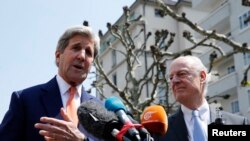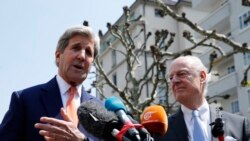The United States and Russia, as co-chairs of the International Syria Support Group, have renewed their commitment to the implementation of cessation of hostilities in Syria.
Intensive efforts to end the fighting are underway in several hot spots, including Aleppo, Eastern Ghouta, and Latakia.
The joint U.S.-Russia statement demands that parties cease indiscriminate attacks on civilians, including civilian infrastructures and medical facilities.
Russia has committed to working with the Syrian authorities to minimize aviation operations over areas that are predominantly inhabited by civilians or parties to the cessation.
As co-chairs of the International Syria Support Group, the United States and Russia are urging all states to implement UN Security Council Resolution 2253 and prevent any material or financial support to Da’esh or al-Nusrah Front or any other designated terrorist organization.
Another area of grave concern is the delivery of much needed humanitarian assistance to civilians inside Syria. Since January 2016, the U.N., with help from the International Committee of the Red Cross and Syrian Arab Red Crescent, has taken significant steps to deliver aid to 255,250 people in besieged areas and 472,975 people in hard-to-reach areas.
However, many Syrians with urgent needs have yet to be reached. Life-saving assistance, including certain medical supplies and personnel to ensure their proper use, have been denied to populations in need.
The co-chairs reaffirmed that all parties must allow immediate and sustained humanitarian access to reach all people in need, throughout Syria, particularly in all besieged and hard-to-reach areas, in accordance with UN Security Council Resolution 2254. Humanitarian access, including by medical personnel, to the most urgent areas must be a first step toward full, sustained, and unimpeded access throughout the country.
The United States and Russia are committed to finding a political resolution to the Syrian conflict. It is critical that all parties to the conflict and other members of the international community promote and support a political settlement in Syria. In this regard, the United States and Russia strongly support efforts to end violence and bloodshed, counter the threat of terrorism, and ensure the implementation of international humanitarian law.
















